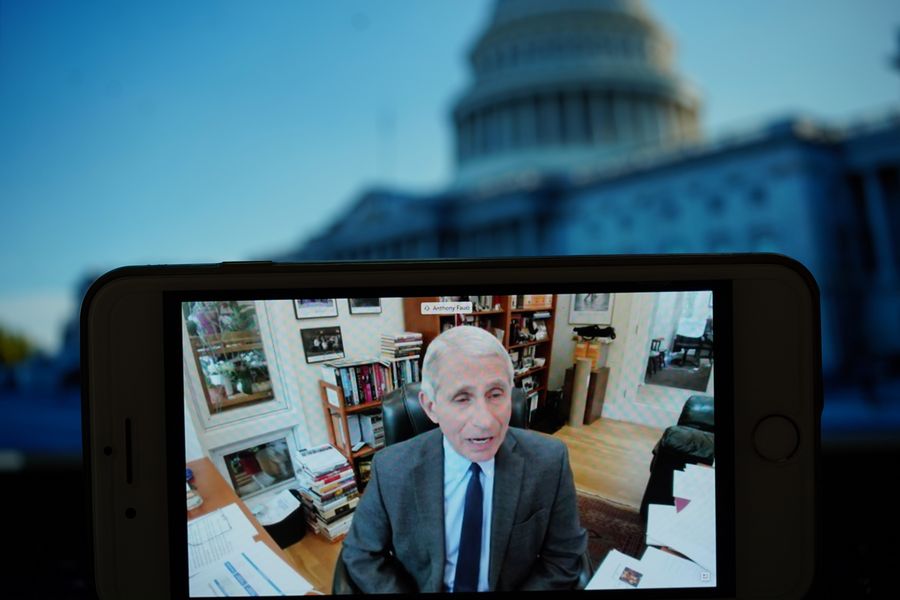A screenshot of the recent report about the U.S. health official Rick Bright on the website of STAT. (Xinhua)
"Without clear planning and implementation of the steps that I and other experts have outlined, 2020 will be darkest winter in modern history," according to Rick Bright's testimony.
WASHINGTON, May 13 (Xinhua) -- Rick Bright, a U.S. health official recently ousted from a post key to developing vaccines, will warn Congress of "unprecedented illness and fatalities" in the nation if it fails to ramp up preparation against the coronavirus, according to his written testimony to a congressional panel.
"Our window of opportunity is closing. If we fail to develop a national coordinated response, based in science, I fear the pandemic will get far worse and be prolonged, causing unprecedented illness and fatalities," Bright will tell in a testimony to the House Committee on Energy and Commerce's health subcommittee.
"Without clear planning and implementation of the steps that I and other experts have outlined, 2020 will be darkest winter in modern history," according to the testimony.
Bright is scheduled to testify on Thursday before the panel after he filed a whistleblower complaint last week alleging he was removed in April as director of the Biomedical Advanced Research and Development Authority (BARDA) for opposing the broad use of a drug frequently touted by the White House as a coronavirus treatment.
"When I resisted efforts to promote and enable broad access to an unproven drug, chloroquine, to the American people without transparent information on the potential health risks, I was removed from BARDA," according to the testimony.
A screenshot of the recent report about the U.S. health official Rick Bright on the website of MarketWatch. (Xinhua)
The official, who is working at the National Institutes of Health with a narrower role, will additionally say that he sought to warn his superiors about potential shortages of critical medical supplies as far back as January, but that his "urgency was dismissed" and that he "faced hostility and marginalization" from Health and Human Services officials, after conveying his concerns about shortages to a senior White House official.
"As I reflect on the past few months of this outbreak, it is painfully clear that we were not as prepared as we should have been. We missed early warning signals and we forgot important pages from our pandemic playbook," Bright will testify.
U.S. President Donald Trump said last week that he doesn't know who Bright is, "but to me he's a disgruntled employee and if people are that unhappy they shouldn't work."
The president added, "I hadn't heard great things about him."
In response, Bright told CBS News that he is not disgruntled.
"I am frustrated at a lack of leadership. I am frustrated at a lack of urgency to get a head start on developing lifesaving tools for Americans. I'm frustrated at our inability to be heard as scientists. Those things frustrate me," he said.
More than 1.38 million people in the United States have been infected by the coronavirus, with over 83,000 deaths, according to the latest count by Johns Hopkins University.

Anthony Fauci, director of the National Institute of Allergy and Infectious Diseases, speaks during a teleconference hearing hosted by a Senate panel on the White House's response to the coronavirus, in Washington D.C., the United States, May 12, 2020. (Xinhua/Liu Jie)
Anthony Fauci, director of the U.S. National Institute of Allergy and Infectious Diseases, told a Senate hearing on Tuesday that the nation has not had the coronavirus outbreak under total control yet, as states, shut down for months, are reopening or planning to reopen.
"If you think we have it completely under control, no we don't," said Fauci, also a key member of the White House coronavirus task force. "If you look at the dynamics of the outbreak, we are seeing a diminution of hospitalizations and infections in some places -- such as in New York City, which has plateaued and is starting to come down, but in other parts of the country, we are seeing spikes."
Besides, he told U.S. lawmakers that it is "entirely conceivable and possible" that a second wave will happen this fall. ■
 简体中文
简体中文



